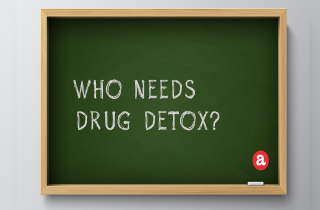Withdrawal is the process during which a person’s body tries to adjust and get rid of any remaining traces of a drug. Not only can drug detox uncomfortable, with symptoms ranging from nausea to hallucinations, it can also be dangerous.
Supervised drug detox is considered to be the safest way to go through this process before drug rehab. Without medical supervision, drug detox can result in some severe complications, including seizures, coma, and even death. To find out if you need drug detox and what to do next, keep reading. Then, we invite your questions about the need for drug detox at the end.
Do I need drug detox?
If you suspect that you’re physically dependent on a drug, it’s best to seek help from an experienced addiction specialist. An addiction specialist will usually be able to help you decide if you need drug detox. You can generally be screened for drug dependence by a family doctor, a psychiatrist, or a licensed clinical psychologist. But it’s best to seek help from a medical doctor to determine the extent of drug dependence and to plan a safe detox.
Establishing the extent of drug dependence usually involves a thorough physical examination as well as a drug abuse screening and assessment. If you are diagnosed with a substance abuse problem or addiction, an addiction specialist will usually recommend medically supervised drug detox.
When do you need drug detox?
At its most basic, you need drug detox any time you are chemically and physically dependent on a drug. And you need drug detox before you enter drug rehab or treatment.
A diagnosis of substance use disorder is usually made with the help of the fifth edition of the Diagnostic and Statistical Manual of Mental Disorders, or DSM-V. According to this manual, you may have moderate substance use disorder if you meet two or three of the following criteria and a severe substance use disorder if you meet four or more of the following criteria.
- Your drug use has interfered with work or family responsibilities.
- You use drugs while participating in potentially dangerous activities, such as swimming or driving.
- You’ve developed a tolerance to your drug of choice and find that you need more of the drug over time to feel its effects.
- You have a strong craving to use the drug.
- You experience withdrawal symptoms when not using the drug for a period of time, and these withdrawal symptoms can be alleviated by using the drug again.
- You often use larger amounts of the drug or spend more time using the drug than you originally intended to.
- You spend a great deal of time using, trying to obtain, or recovering from the effects of the drug.
- You’ve neglected activities or responsibility to use the drug.
- You have a desire to cut down on or quit using the drug but are unable to.
- You continue to use the drug, even though it has caused or exacerbated a physical or psychological problem.
- You continue to use the drug even though it continues to cause social, interpersonal, or legal problems.
Need for drug detox
Drug detox is often an uncomfortable, yet necessary, step along the road to recovery. If you choose to go through drug detox in a medical setting, you can expect to experience some withdrawal symptoms. Typically, nurses and doctors will be on hand to monitor you around the clock and offer assistance when needed. Depending on the type of rehab you choose, you may also be given medications to alleviate or prevent withdrawal symptoms. This can include such medications as methadone, naltrexone, antidepressants, anti-anxiety medications, and/or sedatives.
Your need for drug detox also usually indicates a need for drug rehab as well. Drug detox alone is not a cure. Your next step will be to check into a drug treatment program to continue down your road to recovery. Granted, it will most likely be a long, difficult, and bumpy road, but in the end, it’s worth the effort.
Drug detox questions
Still have some questions about the need for drug detox? Please leave them below. We invite all questions about drug detox and try to respond to each with a personal and prompt reply.









Related Posts